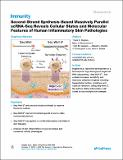Second-Strand Synthesis-Based Massively Parallel scRNA-Seq Reveals Cellular States and Molecular Features of Human Inflammatory Skin Pathologies
Author(s)
Hughes, Travis K; Wadsworth, Marc H; Gierahn, Todd M; Do, Tran; Weiss, David; Andrade, Priscila R; Ma, Feiyang; de Andrade Silva, Bruno J; Shao, Shuai; Tsoi, Lam C; Ordovas-Montanes, Jose; Gudjonsson, Johann E; Modlin, Robert L; Love, J Christopher; Shalek, Alex K; ... Show more Show less
DownloadPublished version (7.017Mb)
Publisher with Creative Commons License
Publisher with Creative Commons License
Creative Commons Attribution
Terms of use
Metadata
Show full item recordAbstract
© 2020 The Authors High-throughput single-cell RNA-sequencing (scRNA-seq) methodologies enable characterization of complex biological samples by increasing the number of cells that can be profiled contemporaneously. Nevertheless, these approaches recover less information per cell than low-throughput strategies. To accurately report the expression of key phenotypic features of cells, scRNA-seq platforms are needed that are both high fidelity and high throughput. To address this need, we created Seq-Well S3 (“Second-Strand Synthesis”), a massively parallel scRNA-seq protocol that uses a randomly primed second-strand synthesis to recover complementary DNA (cDNA) molecules that were successfully reverse transcribed but to which a second oligonucleotide handle, necessary for subsequent whole transcriptome amplification, was not appended due to inefficient template switching. Seq-Well S3 increased the efficiency of transcript capture and gene detection compared with that of previous iterations by up to 10- and 5-fold, respectively. We used Seq-Well S3 to chart the transcriptional landscape of five human inflammatory skin diseases, thus providing a resource for the further study of human skin inflammation.
Date issued
2020Department
Massachusetts Institute of Technology. Institute for Medical Engineering & Science; Ragon Institute of MGH, MIT and Harvard; Koch Institute for Integrative Cancer Research at MIT; Massachusetts Institute of Technology. Department of Chemical Engineering; Massachusetts Institute of Technology. Department of ChemistryJournal
Immunity
Publisher
Elsevier BV